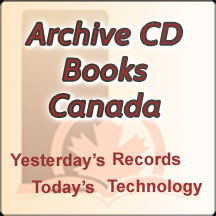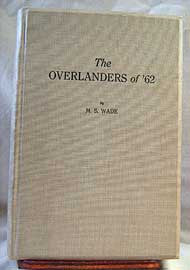Cat No.: CA0423:
“GOLD!” The single word anthem which is widely acknowledged as the fastest way to mobilize: fortune hunters, adventurers, explorers, entrepreneurs and, unfortunately, ne'er-do-wells, into a rush to be early on the “easy pickings” of a new gold field. Such was the case in the late 1850’s when the news started to leak out about gold findings in the Cariboo district and the upper reaches of the Fraser valley of New Caledonia / British Columbia. From outside the continent there was obviously a preference to take a ship to the West coast - even if that included an overland journey across the Panama isthmus. For those already living in the heart of the N. American landmass, however, there were several other routes, some physically less demanding than others (although this generally came at larger financial outlay). For these travellers a route across the plains and mountains promised a more attractive, and probably quicker, route although there was a surprisingly large number of specific trails from which to choose.
No matter how you arrived however, all routes finished on the same, barely made, trails through brush and wilderness of the interior of the barely explored B.C.
One of the main gathering and “jumping-off” points for the overland routes towards the Cariboo and the Fraser gold fields, was St. Paul, Minnesota, (the US/Canada border was of little practical consideration in these times) and so it was that large numbers of fortune seekers tended to accumulate here. A need for good weather when crossing the Rocky Mountains more or less dictated a common departure time and so the travellers tended to form into groups, which also offered opportunities of mutual support, depending on the initial direction of their preferred route. Usually, within such groups, there were still preferences for alternate byways, but generally the pedestrian, overland journey started out heading for Georgetown (on the Red River) and then proceeded via Fort Garry onto the Great Plains. It was during this Plains crossing that parts of the exceptionally large “Overlanders of ’62” party started to divide, each according to their own travel preferences.
By the nature of these almost accidental circumstances there were no “official” records of these events. Fortunately journal and diary keeping was fashionable at the time, and a number of such documents, written by members of the ’62 party, have survived and have found their way into various libraries and archives (notably the Archives of British Columbia.) From these documents and other background information, this book has been compiled (although transcribed and edited) to form a cohesive history of the period of events. By the nature of its source the book does lack some of the basic information one might expect from a traditional history; such as the head-count or makeup of the parties in their separate or conjoined forms. This, however, is usually made up for by, in this instance, a reference to the train of wagons being a significant part of a mile in length. For similar reasons the depth of information about smaller offshoot groups tends to becomes less when they leave the main group because the number of diarists also decreases.
From the point of view of the genealogist, however, the personal experience found in diaries and journals provides many references to individual members of the parties which would NOT have remained in a more “refined” historical or statistical account. In researching the later lives of some of those named in the researched diaries, etc., the editor obtained Biographical notes on them and / or their families and these, numbering 51, are contained in the appendix. (See "More information" for the list.) This book does provide the reader with a first hand, and truly informative, “story” of the people who undertook this adventure and gives details of the sort of experiences and hardships they would have had to deal with to satisfy their cravings for gold.
We invite you to join us in thanking the Slocan Community Library, and particularly their librarian Joyce Johnson, for loaning us this book in the interest of ensuring the continued availability of its content and the preservation of the original. Fully computer searchable.
No. of CDs is: 1 ; Format is: PDF ; Searchable?: YES;
FastFind: Yes; ISBN No.: 978-1-927503-34-8 ;
MORE INFORMATION:
List of Sketch Biographies included:
Alexander, Richard H.; Anderson, Arthur; Anderson, James; Baillie, George; Begbie, Matthew Baillie; Black, John; Bowron, John; Burns, John B.; Cameron, W. B.; Chubbock, Samuel; Cooney, Charles T.; Crysler, Leonard; Cumner, Simeon E.; Cunningham, Robert A.; Dallas, Alexander Grant; Dufrost, Marguerite; Fannin, John; Fortune, A. L.; Fortune, William; Handcock, Alfred Ormsby; Handcock, Harry W.; Harkness, Robert; Hills, Right Rev. George; Hunniford, John; Jessop, John; Lacombe, Father, O.M.I; Mara, John Andrew; Marlow, Peter; McIntyre, Peter; McMicking, Robert Burns; McMicking, Thomas; McNaughton, Archibald; McQueen, Brock; Moore, Samuel; Pattison, Eustace; Phillips, Thomas; Phillips, William; Prest, Dobson; Redgrave, Stephen; Reid, George; Robertson, A. C.; Robinson, Joseph; Robson, Hon. John; Rose, James; Schubert, Augustus; Schuyler, W. B.; Sellar, John M.; Sellar, William; Stevenson, John; Tache, Alexander Antonin; Thompson, Archibald; Tunstall, George Christie; Urlin, Adolphus; Urlin, Alfred John; Wallis, Mark; Warren, Robert; Watson, Hugh; Watson, John; Wattie, James; Wattie, William; White, David Olney; White, Joseph


